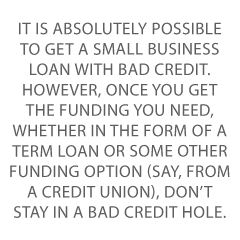How to Get Business Loans with Bad Credit
You may think it is impossible to get a business loan with bad credit. In truth, it is just impossible to do so from traditional banks without some sort of guarantee. There are other options however.
Is It Possible to Get Business Loans with Bad Credit?
For example, the government guarantees loans from traditional banks through The Small Business Administration, or SBA. This government guarantee makes it easier to get loans with lower credit scores than would normally be acceptable.
The key is, how bad is “bad” credit. Generally speaking, you can qualify for a loan most anywhere with a credit score over 730. However, your interest rates may leave a lot to be desired.
If your credit score is less than that, but above 650, you may qualify for one of these SBA loans programs. They all want a 680 score or better.
7(a) Loans
This most popular SBA loan program allows a small business to get a federally funding term loan up to $5 million. In addition, the funds can be used by a small business for expansion, purchasing equipment, working capital and more.
Banks, credit unions, and other specialized institutions (even some alternative lenders) process these loans and disburse the funds to small business borrowers.
What does that mean? It means that you apply with a traditional lender, but it isn’t exactly a traditional term loan.
Thre is a required down payment of at least 10% for the purchase of a business, commercial real estate, or equipment.
Lastly, the minimum time in business is 2 years. In the case of startups, business experience equivalent to two years will work.
Funds are available for a wide variety of projects, from working capital to refinancing debt. You can even buy a new business or real estate.
504 Business Loan
This business financing of up to $5 million. You can use the funds to buy machinery, facilities, or land. Typically, these are expansion loans. They especially work well for commercial real estate purchases.
Terms for 504 Loans range from 10 to 20 years. Unfortunately, funding is slow. It can take from 30 to 90 days.
They use the asset the loan is financing as collateral.
Furthermore, there is a down payment requirement of 10%. This can increase to 15% for a new business.
Like 7 (a) loans, you must be in business for at least 2 years, or management must have equivalent experience if the business is a startup.
Microloans
A microloan is business financing in the form of a small business loan that can go up to $50,000. It works well for starting a business, purchasing equipment, buying inventory, or as working capital.
Community based non-profits administer microloan programs as intermediaries. Unlike most other SBA loans, this business financing comes directly from the Small Business Administration.
They can take upwards of 90 days to fund. The minimum credit score for microloans is 640, and collateral and down payment requirements vary by lender.
Since these are smaller amounts, this type of financing is typically in the form of a short term loan.
SBA Disaster Loans for Small Business
As a general rule, disaster loans go up to $2 million. However, there are tons of changes in the program right now due to the need for COVID-19 relief.
These loans are also processed directly through the SBA rather than through partner lenders. They are for small business owners that have been affected by natural disasters, and the COVID-19 pandemic has been deemed to qualify as a natural disaster.
Terms go up to 30 years. The maximum interest rate is 4%, and you can apply for disaster loans directly at SBA.gov.
The minimum credit score for these loans is 660. Additionally, collateral is necessary if the loan goes over a certain amount. Usually if it is over $25,000, it will need to be a secured loan.
For a military economic injury disaster, the amount that requires collateral is $50,000. Either way, a down payment is not necessary.
SBA Express Business Loan
The max amount for these loans is $350,000. Terms range from 5 to 25 years. You must have a debt to service ratio of 1.1 or higher.
If the loan is greater than $25,000, collateral may be necessary depending on the lender.
As the name suggests, you get funds from express loans much faster. In fact, the SBA takes 36 hours or less to make a decision. Not only that, but the necessary paperwork for application is also less. This makes express loans a great option for working capital, among other things, if you qualify.
SBA CAPLines
There are 4 distinct CAPLine programs that differ mostly in the expenses they can fund. Each of them carries a maximum amount of $5 million.
In addition, the interest rate for each range from 7% to 10%. Like many of the others, funding can take 45 to 90 days.
The four different programs are:
- Seasonal CAPLines
- Contract CAPLines
- Builder’s CAPLines
- Working Capital CAPLines
For these, there is no minimum time in business requirement unless you are getting a seasonal CAPLine. That one carries a one year in business requirement.
Try a Small Business Loan From an Alternative Lender
Traditional banks are not the only option for a small business loan. You can get a business loan from alternative lenders. Most of them operate online exclusively.
We’ve listed a few alternative lender options below. Be sure to double check details like required personal credit score and interest rate, as these things can change without notice.
Fundbox
Fundbox technically offers a business line of credit rather than a loan. However, it is a great funding option because the minimum credit score requirement is lower than most traditional lenders at 600.
They offer an automated process that is super-fast. Repayments are automatic, meaning they draft them electronically, and they occur on a weekly basis.
One thing to remember is that you could have a repayment as high as 5 to 7% of the amount you have drawn currently, as the repayment period is comparatively short.
This means you need to be sure you have enough funds in whatever account you connect them to so that it can cover your payment each week. That requires careful cash flow management.
Loan amounts come as low as $100 and as high as up to $100,000, but the max initial draw is $50,000. They also prefer to see at least 6 months in business, $50,000 or more in annual revenue, and a business checking account with a minimum balance of $500.
BlueVine
The minimum business loan amount available from BlueVine is $5,000 and the maximum is $100,000. Annual revenue must be $120,000 or more and the borrower must be in business for at least 6 months.
Your personal credit score has to be 600 or above. It is important to note also, that BlueVine does not offer a line of credit in all states.
Upstart
Upstart uses a completely innovative platform for their business loan approval process. The company questions the ability of financial information and FICO alone to truly determine the risk of lending to a specific borrower.
Instead, they choose to use a combination of artificial intelligence and machine learning to collect alternative data. They then use that data to help them make credit decisions.
This use of data other than business credit and personal credit is what makes Upstart a good option for a bad credit business loan. If you have bad credit, other factors will come under consideration.
Alternative data can include mobile phone bills, rent, deposits, withdrawals, and even other information less directly tied to finances.
The software they use learns and improves on its own. You can use their online quote tool to play with different amounts and terms to see the various interest rate possibilities.
Typically, business loans are available ranging from $1,000 to $50,000. Interest rates vary greatly, ranging from 7.5% to 35.99%. You can pay back loans over either 3-years or 5-years.
To be eligible for a loan with Upstart, you must meet the following qualifications:
- Credit score of 620+
- No bankruptcies or negative public records
- No delinquent accounts
- Meet debt to income standards (they only note they will check this ratio, not what their standards are.)
- Have fewer than 6 inquiries in the past 6 months on your credit report, not including those related to student loans, vehicle loans, or mortgages
These are the requirements they list on their website. One independent review said that the requirement for the debt to income ratio is a maximum of 45%. It also says that the minimum annual income has to be at least $12,000.
Fora Financial
This lender funds more than $1.3 million in working capital around the United States. There is an early repayment discount if you qualify.
This is a great option for a bad credit business loan as well. Why? Here is what they say about credit score:
“At Fora Financial we do not believe that the number of your credit score defines who you are as a business owner. We look at your entire business model along with your future plans to create a financing program that will help you reach your goals.”
As you can see, there really isn’t a minimum credit score requirement.
Loan amounts range from $5,000 to $500,000. The business must be at least 6 months in operation and the monthly revenue has to be $12,000 or more. There can be no open bankruptcies.
OnDeck
Obtaining financing from OnDeck is quick and easy. First, you apply online and receive your decision once application processing is complete.
If you receive approval, your loan funds will go directly to your bank account. The minimum loan amount is $5,000 and the maximum is $500,000.
They do require a personal credit score of 600 or more for at least one owner.
Since traditional lenders tend to require a personal credit score much higher than this, OnDeck works well for businesses that need a bad credit business loan.
Also, you must be in business for at least 3 years. Annual revenue must be at or exceed $100,000.
In addition, there can be no bankruptcy on file in the past 2 years and no unresolved liens or judgements.
Kiva
Kiva is an online lender that is a little different. For example, the interest rate is 0%, so even though you have to pay it back it is absolutely free money.
They do not check your personal or business credit. However, there is one catch. You have to get at least 5 family members or friends to throw some money in the pot as well.
Unlike other alternative lenders, you have to pitch in a $25 loan to another business on the platform.
Accion
Accion is a microlender, a nonprofit, that offers installment loans to both startups and already existing businesses.
You don’t have to already be in business, but if you are not, you must have less than $500 in past due debt. In addition, your business needs to be home or incubator based.
Loans are from 6 to 60 months and interest rates range from 7% to 34%. A personal guarantee, and sometimes specific collateral, is necessary in most circumstances.
What’s the minimum credit score? Accion says it best in their FAQs:
“Credit is just one of many factors that we look at when we work with business owners. If your credit isn’t well established or damaged, we can work to find strengths in your business or finances to make the loan possible. We do have firm requirements on past due debt and bankruptcies and have credit score minimums in some areas, so please check our loan requirements to see if we are a good fit for you.”
Basically, depending on your other information, Accion can be a good option for bad credit business loans.
National Funding
National Funding is an online lender that offers rapid finance options to small businesses, sometimes with approval and funding in as little as 24-hours.
According to their website, this lender doesn’t focus on credit alone. They claim they take the time to get to know the owner and the business in an effort to find a funding solution for your specific needs.
Why are they considered a good option for bad credit business loans? Because some reviews, like this one from NerdWallet, state that the minimum credit score is as low as 600.
Merchant Cash Advance
If you accept credit cards as payment, you may qualify for a merchant cash advance. Your business must bring in $100,000 or more per year in credit card sales.
The minimum credit score can be as low as 500, so this type of cash advance is an option even if you have poor credit.
Typical approval amounts equal one months’ credit processing volume. So, you’ll also need 3-6 months of bank and merchant statements.
Business Credit Card
It is possible to get a business credit card with poor credit. But, you’ll find when you start to look for a business credit card that you can get without a strong credit history, there are not a lot of options.
Those that are available don’t have the best rates or terms, and credit limits may be quite low.
Approval for a business credit card with bad credit depends on just how low your poor credit is.
If you have fair credit, you may be able to get the Capital One® Spark® Classic for Business.
It has no annual fee, but there is no introductory APR deal. The regular APR is a variable 26.99%.
In addition, you can earn unlimited 1% cash back on every purchase for your company, with no minimum to redeem.
While this credit card is available if you have fair credit scores, beware of the APR. If you can’t manage cash flow to pay on time and in full, skip it.
Build and Improve Business Credit and Forget About Bad Credit Business Loans
Maybe one of these options will work for you. But what if you didn’t have to worry about finding business funding that you can get with bad credit?
What if you could get the funding you need to run your business, grow and scale, manage cash flow and more without fear of poor credit history getting in the way?
Guess what? You absolutely can! How? Well, first, you have to set up your business to be an entity separate from yourself. This is how you ensure your business debt is not on your personal credit.
That way, when you take out debt in your business name instead of a personal loan, the accounts will report to your business credit and not your personal credit.
There is a lot to building Fundability. There is more to it than your business credit score.
- Make sure you and your business do not share contact information. Your business needs a separate phone number and address.
- Get your business an EIN so you can apply for business credit without your SSN.
- Incorporate your business as an LLC, S-corp, or corporation.
- Make sure your business has all the licenses it needs to operate legally.
- Open a separate, dedicated business bank account.
After your business is set up properly, you can work with starter vendors to build business credit apart from your personal credit.
These are companies that sell things you use in the course of everyday business, like office supplies, cleaning supplies, even packaging materials.
They will issue net invoices without doing a credit check, so you don’t have to have good personal credit or a good business credit score to get an account with them.
Then, they will report your payments to the business credit reporting agencies. That gets the ball rolling and starts building your business credit score.
It is Possible to Get Business Loans Even with Bad Personal Credit
It is absolutely possible to get a small business loan with bad credit. However, once you get the funding you need, whether in the form of a term loan or some other funding option (say, from a credit union), don’t stay in a bad credit hole.
Building your business Fundability will open a whole new world of vendor credit, business credit cards, and a ton of other options without worry over a low credit score. Trying to find a bad credit loan will be a thing of the past.
Get to work building a ladder to get yourself out. Get the funds you need to stay open, but at the same time, work to put yourself in a better position for the future.
Then, you won’t have to choose your financing option based on whether you have a bad credit score or good credit.
You can choose based on the financing option that will work best for your small business without worrying about credit history.



They are for debtors who’ve a bad credit score scores.
It's very useful to know that people with bad credit history can still get a business loan. The other day, my mom mentioned that she'd love to make her dream of starting her own business a reality. She's working hard to build her credit again, but she's struggling to start her project, so I'll suggest she reads your intake on different types of business loans.